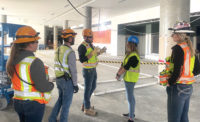Impacts of the COVID-19 pandemic have turned normally rosy market and bottom-line projections by design and construction management firm CEOs upside down as firms navigate unknowns of client health, shifted workloads, virtual work productivity and technology use, say execs and recent surveys by two sector financial management consultants.
But the CEOs and others point to some positives in potential government stimulus and boosted revenue from selling technology services.
Results from 200 CEO respondents to an annual market survey by consultant EFCG were clear on pandemic impacts, as the 8% average 2020 net revenue growth predicted last October fell in May to 3-5%.
No V-shaped Recovery
“This will not be a V-shaped recovery,” Northwestern University business professor Ronald R. Braeutigam told attendees of EFCG’s virtual CEO conference Oct. 7. “For the first time in 80 years, the U.S. now joins those few countries with debt larger than GDP.”
Despite the pandemic's current and near-term financial impacts and unknowns, Braeutigam said a stimulus would boost confidence in the U.S. economy and "benefit AEC segments," and he offered attendees some optimism that business health will recover from the current downturn as it did from two previous ones.
EFCG Managing Partner Jessica Barclay noted, however, that if the downturn shows a similar pattern, “it will be 2023 to 2024 before industry growth numbers recover.”
Technology “will be a game changer, as a revenue creator or as a death knell if it’s not harnessed.”
– Keryn James, CEO, Consultant ERM
Barclay said EFCG’s survey shows 60% of respondents seeing significant challenges in municipal and private sector markets. “This is the first time transportation is not at the top of our [market] list,” she said, although noting that the transforming energy sector has propelled renewable power work into the top three for the first time.
About 70% of firms reported “pricing pressures” from state/local and private clients in the U.S., with 29% noting requests to cut fees by 10% or more.
More cost pressure also is stemming from competitors, with worry over backlog growth, Barclay said, adding that the trend “risks a race to the bottom and puts the industry in a precarious position.”
Laurent Germain, CEO of Frence-based design firm Egis, said "price pressure is high and the business model is changing, but I won't take a project with a low margin or loss to increase market share."
CEOs see technology adoption as a tool and added business service that is key to future cost efficiency and growth. “The digital impact will be a game changer,” said Keryn James, CEO of environmental consultant ERM. “We are a knowledge industry. The way we deliver and deploy it for clients is fundamentally changing.”
Woolpert CEO Scott Cattran termed the pandemic "a serendipitous event to force innovation."
Selling Technology
Rebecca Zofnass, another EFCG managing partner, told attendees that 7% of surveyed CEOS say their 2020 acquisitions were technology related, up from 4% in 2015. About 25% of CEOs report their firms actively sell technology to clients, a figure that will triple in three years.
"People who join the industry are wired to be innovative, but often companies miss the signal to provide more support to grow innovation in their ranks," Golder Associates CEO Hisham Mahmoud told peer attendees, adding that AEC firms "are not wired to commercialize great ideas as other business sectors have done."
Rachel White, CEO of Arcadis Gen, a wholly owned digital business unit of the Dutch engineer that was launched in January, noted its cultural differences. "We don’t have grades or structure and our ecosystem is different," she said. "Our customers expect different things from us than from the core business." The startup now has 230 staff and four product lines.
"Change is hard but not changing is even harder," said White. "'I'm an engineer so I have to unlearn everything to lead a tech company. Disruption requires bravery."
But CEOs still have qualms about technology-enabled remote work. An instant poll of CEOs at the EFCG conference revealed that 50% are unlikely to move to a full or mostly remote workforce setup when the pandemic eases.
Alexandre L’Heureux, CEO of WSP Global, noted that while he has been "surprised at the quality of work and level of client service" from its remote workforce so far, “I am absolutely convinced that working with people in the same physical space and bouncing ideas after a meeting has so much value. “I see benefit in returning to the office.”
Cattran added that "every CEO will have to evaluate tradeoffs in their organization" of a fully virtual workforce. "Can your culture support that? You need a high degree of trust to operate that way."
He foresees accelerated technology investments by firm and repurposed office space to improve overall collaboration, but "it wont completely replace the model."






Post a comment to this article
Report Abusive Comment